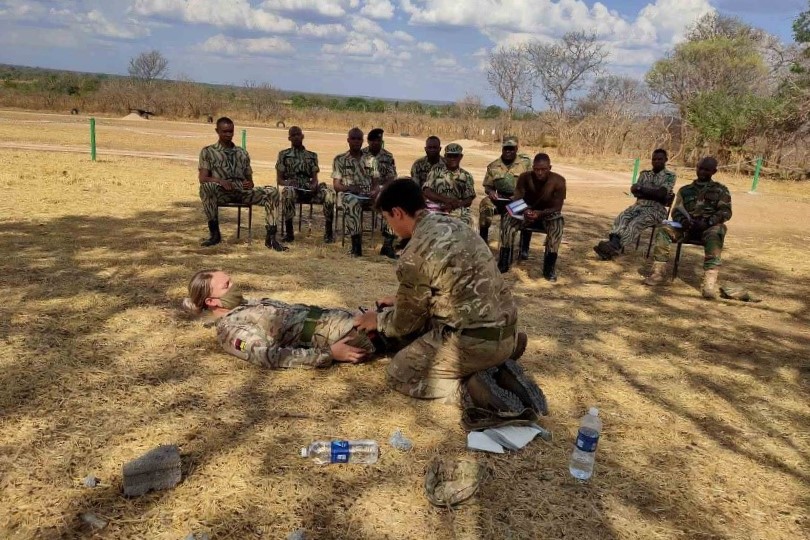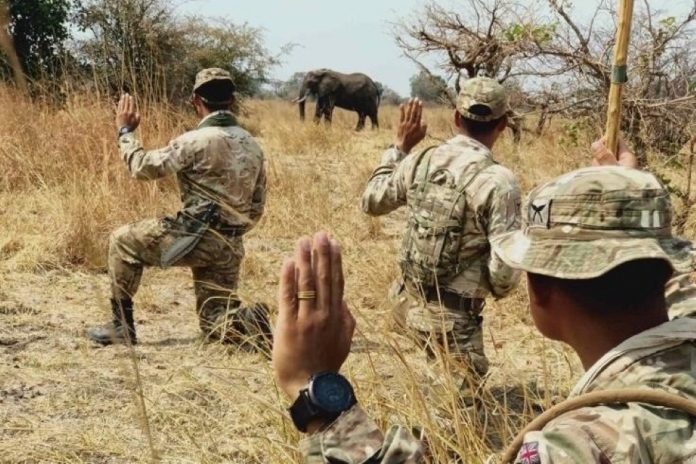Troops from the Royal Gurkha Rifles have spent six weeks training Zambian rangers in counter-poaching, helping to strengthen Zambia’s response to the illicit wildlife trade, estimated to be worth up to £17 billion a year internationally to criminal gangs. With Zambia home to a large elephant population and a number of rare and endangered species, the authorities are tackling both poaching and illegal trade after seeing an increasing number of syndicates who sell products on the international market.
The 30-strong unit supported the Zambian National Anti-Poaching Task Force by sharing a wide range of soldiering skills that can be used to track and combat poachers. A total of 119 students from the Zambian Police, Armed Forces, National Service and Department for National Parks and Wildlife were trained under the programme.
The training and exercises in the 8,600 square miles of Kafue National Park allowed British soldiers to pass on their expertise, including interception tracking tactics, evidence gathering, leadership development and medic response training. The Zambian rangers were also trained in the use of lightweight patrol packs and first aid kits so they can operate at greater distances from their bases, covering more ground in isolated areas where the poachers are more active.
Minister for the Armed Forces James Heappey said:
The UK is committed to tackling the illegal wildlife trade, which has a destabilising impact on communities across Zambia, and the wider continent. These deployments are also a valuable learning opportunity for the soldiers, operating in challenging terrain and learning bush-craft from the rangers.
Having trained over 200 rangers in Malawi and 119 in Zambia, this work by the British Army aims to reduce poaching at source and uses sustainable, community-led solutions to protect and conserve wildlife.
Zambian rangers learning tracking techniques
The latest training mission comes after four previous deployments of British troops to neighbouring Malawi, where soldiers trained over 200 rangers in Liwonde National Park to improve patrolling effectiveness and information sharing with other partners. The team in Malawi also helped to move two black rhinos which had been transported by air and road from KwaZulu National Park in South Africa under a scheme to boost their population in the region.
Major James Marden, Officer Commanding, said:
This was a unique operation unlike anything I have done before, enhanced by it being the first British counter-poaching training support mission in Zambia. It was hugely rewarding working with such a diverse team.
Since our departure a new course has already started with the Zambian instructors changing the recruit training syllabus to align with the lessons taught.
The partnership with Zambia, funded by the Department for Environment, Food and Rural Affairs (Defra) and delivered by the British Army, aims to crack down on the illegal wildlife trade. The UK Government is at the forefront of global efforts to protect endangered animals and plants from poaching and has committed more than £36 million to tackle the illegal wildlife trade between 2014 and 2021.
International Environment Minister Lord Goldsmith said:
The illegal wildlife trade fuels corruption, impoverishes communities and threatens the existence of some of the world’s most iconic animals. Many species are now critically endangered because of this trade and the UK government is committed to ending it.
Rangers, with the support of the UK soldiers, can create safe places for people and wildlife and are vital in delivering long-term conservation successes.
This is the first deployment of its kind in Zambia and by sharing skills and expertise, we can work together to fight against poaching and illegal smuggling.
The UK is hosting COP26 next year in Glasgow where the protection of natural assets including wildlife protection and tackling deforestation and landscape degradation will be key themes. This ranger training helps to promote these goals by supporting authorities and local communities to protect and value local resources.

British troops share their medical skills with the rangers







